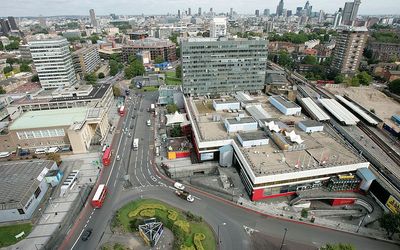
In an extraordinary move Southwark Council is poised to 'buy' both the Elephant and Castle shopping centre and the London College of Communication from current owners, developer Delancey and the University of the Arts London (UAL). It is also excercising Compulsory Purchase Order (CPO) powers over the shopping centre site, on behalf of Delancey's British Virgin Islands registered offshore subsidiary[^1].

The CPO powers are needed because Delancey has failed to reach agreement with 11 of the remaining shopping centre traders who have secure tenancies and several other so-called third-party 'interests' including land owned by Transport for London and arches owned by Network Rail/Arches company. [^2]
The additional purchase of the shopping centre and LCC land is part of a legal manoeuvre, vesting ownership in a public body, that will override the rights of residents in surrounding homes whose daylight will be affected by the redevelopment of the two sites. A leasing arrangement will allow both sites to return to Delancey and UAL once the CPO process is complete. [^3]

Southwark say that both measures will ultimately result in no cost being incurred to itself (except for officer time plus a proportion of any public inquiry costs) with Delancey indemnifying all other costs, but no figures are provided in the three publicly available reports detailing the purchase arrangements and the indemnity agreement has not been made public. Decisions on both measures will be made at a video-call Cabinet meeting tomorrow - Tuesday, 24 March.
Will the scheme ever happen?
The main justification for the proposed measures is to ensure the success of the development. Council officers advise that if they are not adopted Delancey may meet delays and will not secure the 'enormous funding' the scheme requires and then the site could lie empty for years.
Despite this concern, officers are nonetheless so personally convinced that the development will 'likely' go ahead, that they are not requiring a guarantee from Delancey that it will proceed with the scheme after Southwark has cleared the site with its CPO powers. The CPO report says 'it is not necessary to impose... an obligation to build the Scheme as the measures negotiated for inclusion in the indemnity agreement give the Council comfort that EC is likely to proceed with the Scheme.' [^4]
The contrast between Southwark's favourable treatment of Delancey, (a property developer rooted in offshore shell companies) and the neglectful manner it has treated traders who have made the Elephant their home is also laid bare. Under CPO legislation Southwark is required 'to exercise its power...in a manner which, so far as practicable, secures that relevant occupiers of that land are provided with a suitable opportunity to obtain accommodation on the land in question.' [^5]

This hasn't happened; such relocation benefits as there are (eg the £634,700 relocation fund, the £200k New Home Bonus Fund) have been won by the traders and local campaigners and owe little to Southwark Council's efforts. Even with these gains, 60 traders still have no new premises and those who do will be re-housed off-site, with only some (those in Castle Square) having the smallest possibility of 'accommodation on the land in question'. Just last week the BBC ran a feature on the plight of the remaining traders.
Southwark has always had the power
By Southwark's own account the scheme may well not go forward unless it exercises CPO powers, because Delancey is unwilling to bear the risk of the uncertainty created by its absence, given its 'enormous capital investment in the Scheme' and in addition 'any prudent funder of the Scheme is also unlikely to fund the Scheme whilst that uncertainty persists'. [^6]
Southwark therefore has had a great deal of legitimate leverage. It was clear when Delancey first submitted its planning application for the shopping centre's redevelopment back in 2016, that there was little intention of retaining resident traders in the new redevelopment. When Delancey described the traders as 'benefiting from disproportionately low levels of rent' and unlikely 'to survive....over the longer term'. [^7] Southwark should have made it clear then that any anticipated use of CPO powers would be dependent on fulfilling the requirement that 'relevant occupiers' ie the traders be given the opportunity to stay in the new development.

As it is, it looks as if Southwark intends to sacrifice trader's interests, again, in favour of Delancey, just as it sacrificed those who depend on social rented housing, when it granted Delancey planning permission, without securing the minimum amount required by its own policies.
The coronavirus risk
Southwark's attempts to indemnify itself against any mishaps in its CPO arrangements with Delancey includes, amongst other things, a requirement that there be a 'reasonable prospect of the development of that area being delivered in a reasonable time frame' [^8].
Any sensible person, or local authority, must now see that this is unlikely, given the coronavirus crisis and it multi-dimensional impact. Southwark should at the very least defer consideration of exercising CPO powers and the purchase of the shopping centre and the LCC sites, on any terms. At the same time, Southwark should use its resources to maintain and improve support for the traders and insist that Delancey do the same, if it wishes to have the benefit of Southwark's CPO powers at some time in the future.
Footnotes:
[^1]: According to Southwark, Delancey is not the developer, but rather the advisor to the so-called 'Triangle Partnership', which is a partnership between the Dutch pension fund APG; Qatari Diar and Door SLP (a joint venture involving Delancey's DV4 offshore property fund). There are further partnerships within this Triangle, detailed in the Report: E&C CPO para 12. Southwark refer to the developer as Elephant & Castle Properties Co. Limited ("EC") registered offshore in the BVI. We continue to refer to the developer by the commonly known name of 'Delancey'.
[^2]: See paras. 80, 59 Report: E&C CPO
[^3]: See paras. 1,2 & 12 Report: E&C Property Rights
[^4]: See para 76 Report: E&C CPO
[^5]: See para 81 Report: E&C CPO
[^6]: See para 57 Report: E&C CPO
[^7]: See 8.7 Planning Statement
[^8]: See para 74 Report: E&C CPO